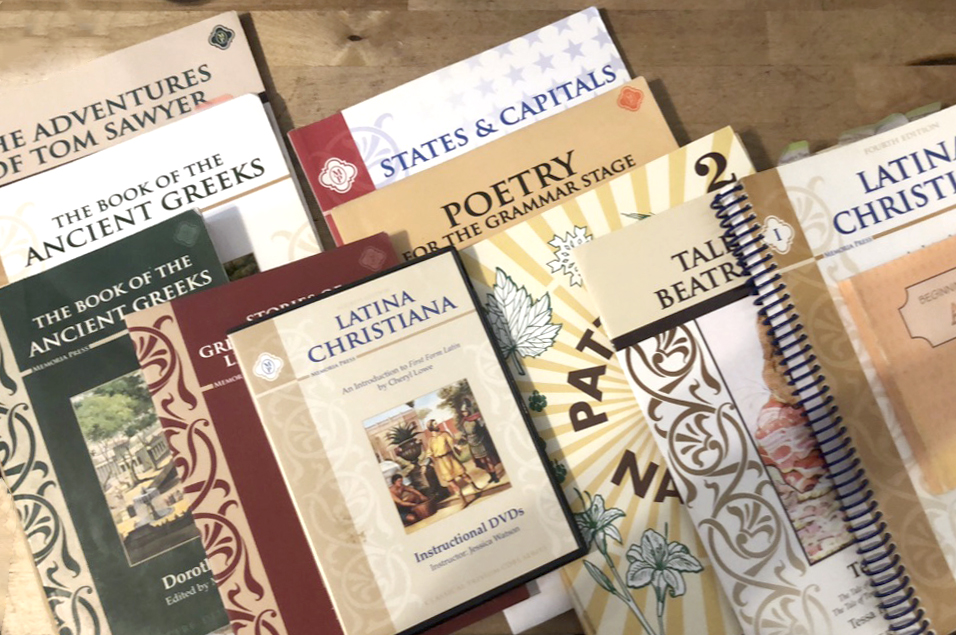
Boxed curriculums are a mixed blessing. Those pre-assembled packages and lesson plans make it so easy to choose each year’s materials. But they also bring out the grade level monster. If a book is in the 4th grade package, and we use it in 6th grade, we assume our child is behind. Here’s how we make Memoria Press for work us when it comes to homeschool grade levels.
The Problem with Grade Levels
Grade levels assume that all children of a certain age are ready to learn the same thing at the same time. In reality, there’s a wide range of abilities in children of the same age — even among children without learning challenges.
This leads to classrooms where some children fit the mold, others are ahead, and others are behind. Teachers try to differentiate for all of them but many children end up feeling out of place.
This is one of homeschooling’s greatest benefits. We can place our children where they need to be, in each subject, right here, right now.
We all talk about this “beauty of homeschooling,” but how many of us really live by it?

How Homeschool Grade Levels Affect Our Choices
When we look for homeschool materials, do we search by grade? Do we say, “my child is in 4th grade but we’re using materials from 3rd, 4th, and 5th?”
Those of us that use boxed curriculums are especially prone to this. Curriculum companies want to make things simple for busy families: have an 8 year old? Here’s what you need for third grade. Done.
But SO MANY children don’t fit inside these boxes.
Curriculum providers try to address this in different ways. Some use lettered levels instead of numbered grades while others place suggested grade ranges on their programs.
With Memoria Press, I’m able to customize our program up or down and their website’s Customize tab gives suggestions on what is appropriate for different grade ranges.
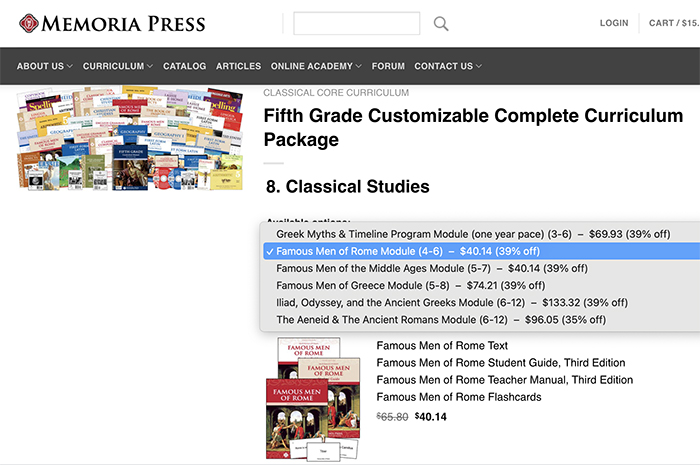
I can also look at individual books on the website and see their recommended grade levels.
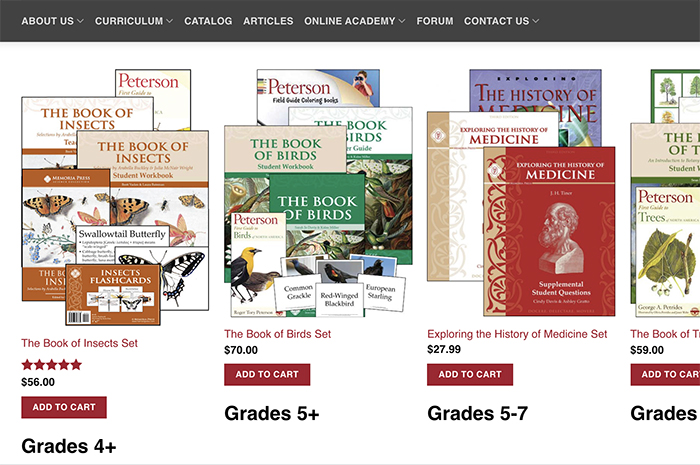
How Grade Levels Affect Homeschool Moms
This post contains affiliate links. Links to free items may place an affiliate cookie on your device for future purchases. Purchases help support our family at no additional cost to you. For more details, see our full disclosure and privacy policy.
Even with these resources there’s still a problem and, quite frankly, it’s with us moms. I totally include myself in this!
When we see Greek Myths scheduled in the 3rd grade package, we tend to forget that it’s great for children in a wide range of grades. We then tell ourselves that our children are behind if they’re using it in 5th or 8th grade.
But here’s the truth:
- They’re behind if the book is only good for 3rd graders.
It’s not. Are they getting to it later than other kids? Yes. Is this a bad thing? It’s where they are — and it’s where we need to meet them. - They’re behind if we’re determined to use every. single. thing MP offers in classical studies.
Fear of missing out is a real thing, but I’ve found that it usually stems from pride. We fear our children’s education won’t be good enough, or special enough, if we don’t do all the things.
It will be lovely if my kids read the Greek Tragedies in high school. But if we can’t get those in, I know the kids will have the foundational knowledge to read them on their own as adults. - They’re behind if we’re not willing to think outside the box when planning.
My rising freshman didn’t do Greeks/Homer in middle school but I know it’s very important for understanding the rest of history. So I did some creative planning in high school. He’ll be studying the most important things without trying to cram in everything.
The Solution to Grade Level Thinking
The solution to grade level thinking is to focus on the Order of Learning instead. What do our children need to learn now, to be prepared for later knowledge?
A sixth grader at a good school may be able to profit from works that a twelfth grader at another school cannot because the sixth grader received preparation and the twelfth grader never did.
Educational maturity is not just a matter of time, but of well-thought-out and intentional development…
MARTIN COTHRAN
The trick is that we can’t skip steps!
Homeschool Grade Levels vs. Order of Learning
Skill Subjects
Skill subjects need to start at the beginning. But this isn’t a grade level thing, it’s an order of learning thing.
For example, if a child is entering Memoria Press with no grammar background (that’s where my kids were!), they need to start with Book 1. They need to know what a verb is before they can understand the various types of verbs.
Nature Studies
Knowledge of the stars isn’t reliant on knowledge of mammals, and vice versa, so nature studies can be done in any order. Upper level science can be done in various orders as well, depending on your child’s goals (and who you talk to!)
Note: History of Medicine can be a difficult read because of all the death and illness involved. Something to consider if you plan to use it with younger children.
Classical Studies
Memoria’s early classical studies are story-based so chronological order isn’t necessary.
One caveat is that I definitely recommend saving Famous Men of Greece for older kids. It’s more philosophical so 11-13 year olds tend to get more out of it.
Upper level classical studies are a deep dive rather than story-based, so higher level history needs to start with Greece. The history and ideas of the Greeks prepared the soil for everything that followed, including Rome and Christianity. But again, it’s not a grade level thing. It’s the order of learning.
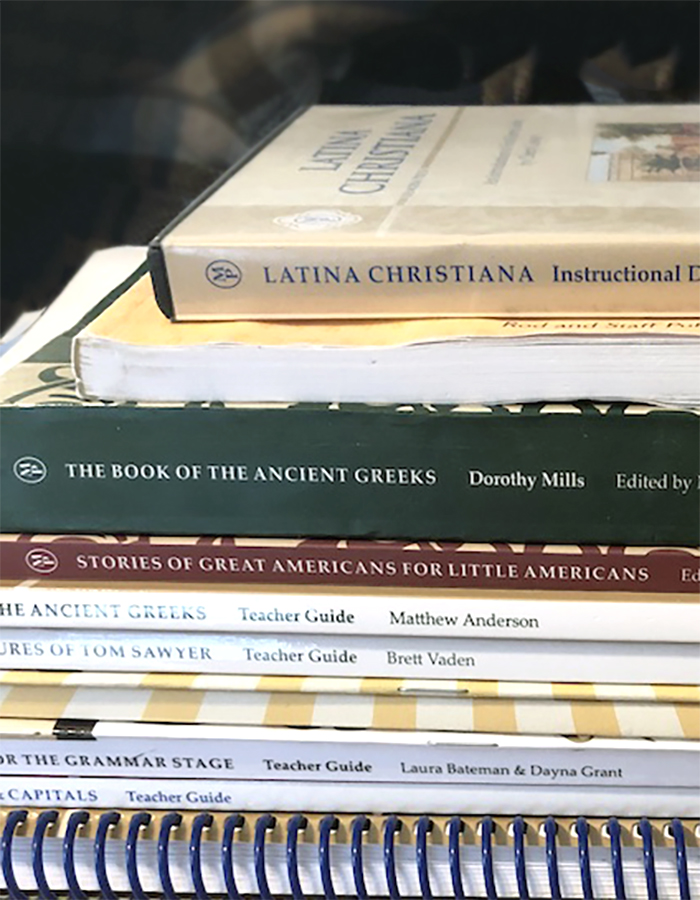
The Order of Learning when Homeschool is Temporary
I know many families plan to send their children to brick and mortar school at some point. This makes homeschool grade levels feel more important, but here are some things to consider:
- Keep the order of learning in skill subjects.
It’s not going to help your child to be in a 4th grade math book when they’re really only ready for 3rd. All it will do is let your child place into a class with kids who know more than they do. And that will likely make your child’s math struggle permanent.
- Think outside the box for scheduling.
Do 3rd grade math well during the year and then start 4th grade math in the summer. Or, wait on composition and devote that time to doing more math during the school year. Just make it a priority to do it well, not simply get through it.
This will bring your child up to grade level gradually so that neither of you burn out.
- Include state-specific requirements.
If your state has special requirements such as state history/geography, add those into your school year — but be willing to drop something else so you don’t burn out!
- Don’t stress about content subjects.
Content subjects vary from school to school so don’t worry if your chosen school covers marine life in 5th grade and you’ve done astronomy.
Remember that many public and private schools don’t have continuity in the curriculum from one year to the next. If you’re worried about a particular topic, gather some good books for the kids to read in their free time. They’ll learn plenty, and probably retain more than those who sat in a typical, non-mastery class about it.
A Word From a Teacher
My sister is a well-respected teacher in her local public school system and she had this to say:
As far as kids being behind, that is subjective. The best advice I could give on that is, if you’re worried that your child won’t make a good transition, contact the school. See if you can talk with the teacher so she can share what the state’s standards are. But remember that a specific grade’s standards are what kids are expected to know at the end of that grade, not the beginning. These aren’t what your child needs to know to enter that grade.
[In the elementary years] you can usually put a child into any grade and it’s up to the school to get them caught up if there are gaps. But that means you will need to be willing to work with the teacher on those items.
Have some grace. Your kid is your kid and they’re at where they’re at; and it’s the school’s job, once they get there, to get them on grade-level.
What about Standardized Tests?
I grew up taking standardized tests (and actually thought they were fun!) but I’m not a huge proponent of them.
These tests can help figure out placement in skill subjects; but the various takes on social studies and science progressions means these scores have to be taken with a large grain of salt.
So What Grades are My Kids In?
For kids in K-2, I write down whatever grade level we’re doing. In grades 3-8, I write down whatever grade the state would put them in based on their age (the only time I don’t do this is if I intend for that child to graduate one year later than age). For high school, we stick to grade levels because of transcripts.
Based on this, I have kids in K, 4th, 6th, 7th, 9th, and 12th.
But those kids are using materials from K, 2nd, 3rd, 4th, 5th, 6th, 7th, 9th, 10th, 11th, and 12th.
And I’m okay with that.
PIN FOR LATER:
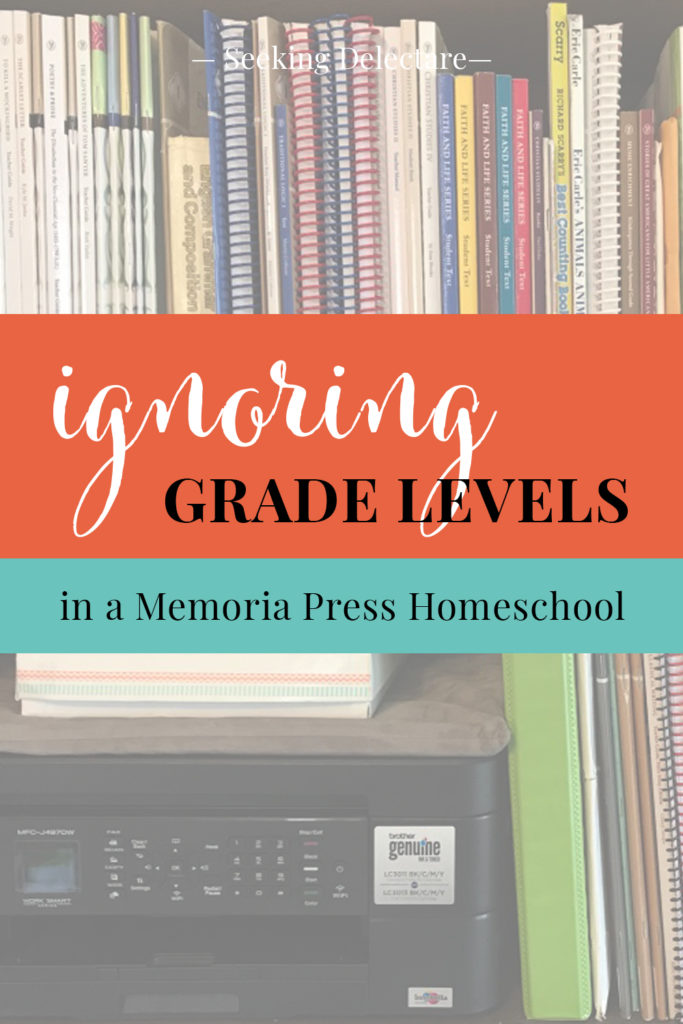
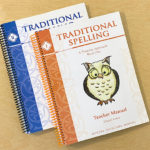

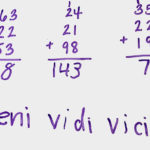
Thank you SO much! I’ll be coming up on my 5th year of using MP’s materials and I always feel so behind and badly that my kiddos are using the grade below their actual “school year”, yet they’re learning a lot. I needed to read this!
Thank you. This article was really, really good…and timely!
Excellent read! Thank you for your guidance.